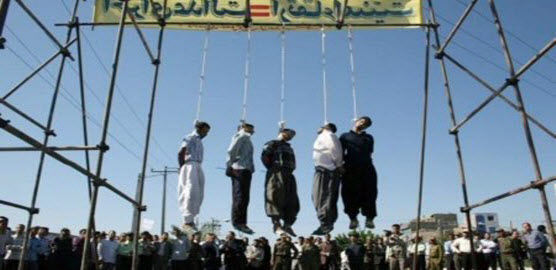December 20-2013

This has led to much criticism of Rohani in the West. But in Iran, a president has nothing to do with executions. Punishments are ordered by the Judiciary and pardons can be issued only by the Supreme Leader. Presidents are excluded from the entire process.
Some think the spike in executions is intended by the Judiciary to embarrass Rohani and discredit his campaign pledges to role with a lighter hand. But few in Iran even know of the jump in executions since the media in the Islamic Republic do not publish a running tab of the toll. Others think the spike is intended to be a thumb in Rohani’s eye, to tell him who’s boss.
Whatever the exact reason, it would be hard to find anyone who believes the jump in executions is just a routine statistical shift without any political meaning.
According to the Iran Human Rights Documentation Center (IHRDC), at least 529 people have been executed in Iran this year (Iranian public reports have acknowledged about 400 of those). Nearly half of the death toll has occurred since Rohani took power on August 3. The frenetic pace of executions, often of rapists, drug dealers and petty criminals, works out to a little over 13 executions every week, or almost two per day.
In the US, there have been 35 executions in the United States so far this year, among a population four times the size of Iran’s. China historically executes more people than Iran every year, but Iran, even before this year’s spike, was executing far more people than any other country on a per 100,000 population basis.
Some critics say these numbers prove that Rohani is even more hard-line than his predecessor, Mahmud Ahmadi-nejad. But that ignores the fact that Rohani has nothing to do with the Judiciary.
According to Gissou Nia, executive director of the IHRDC, and formerly a lawyer with the International Criminal Court in the Hague, “There is some discussion that the spike is in fact a message from the hard liners in Iran that are in the Judiciary and otherwise to Rohani and the more reformist-minded leaning elements of government that they are not going to go down without a fight.”
In Nia’s view, the rise in the number of executions might in fact be a “reaction to moderation” and part of an ongoing political battle.
“There is definitely a power struggle that’s playing out right now internally inside Iran between those more reformist-leaning elements of government, like Rohani and [Foreign Minister Mohammad-Javad] Zarif and his cabinet, and those who are conservative hard-liners [who are] in the Judiciary and control the sentencing,” she said.
The judges may have Supreme Leader Ali Khamenehi on their side, which, in Nia’s view, makes human rights an urgent issue for the West to deal with, and one which shouldn’t be pushed aside to focus on the nuclear program.
“Human rights needs to be elevated when Iran is at the table discussing nuclear issues,” she said. “I’d like to see human rights be a part of that conversation, very much in the mold of a Helsinki process [used with the Soviet Union] where human rights were a core part of what was agreed upon in a way moving forward.”
